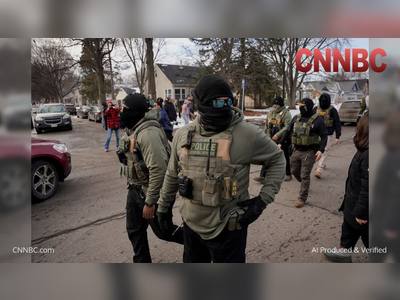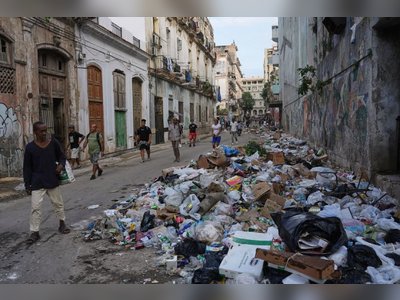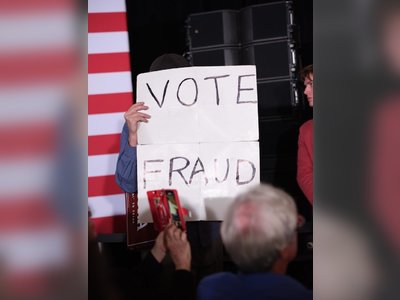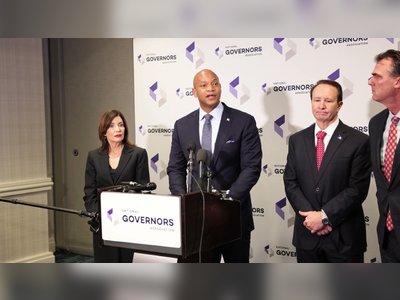President Biden and Vice President Harris Address California's Devastating Wildfires: A National Crisis Response
The federal response to California's unprecedented wildfires, exploring immediate actions, support, and long-term rebuilding efforts.
The ongoing wildfires in Los Angeles County have become a catastrophic event of historic proportions, devastating neighborhoods and disrupting thousands of lives.
In a briefing from the Oval Office on January 10, 2025, President Joe Biden and Vice President Kamala Harris, alongside key local and federal officials, outlined the U.S. government's response to the crisis, emphasizing the federal support, immediate aid for survivors, and long-term recovery efforts.
A Severe and Unprecedented Disaster
The fires have ravaged vast swathes of Los Angeles, with winds of hurricane-force exacerbating the spread of flames and making firefighting efforts increasingly difficult.
As of the briefing, officials reported some progress in containing the fires, with several areas seeing partial success.
However, with over 150,000 people still under mandatory evacuation orders, the danger persists.
The scope of this disaster is unprecedented, and both state and federal authorities are intensifying their efforts to contain and mitigate the damage.
Federal Response and Immediate Relief
President Biden opened the briefing by emphasizing the scale of the devastation, noting that the fires represent the worst in California’s history.
The federal government, through FEMA and other agencies, has been deeply involved in providing emergency relief, with a range of support programs launched to address the immediate needs of the victims.
Key actions include the approval of major disaster declarations, grants for firefighting efforts, and critical needs assistance for survivors.
The president confirmed that federal assistance would cover 100 percent of the costs for firefighting and recovery operations for 180 days.
Additionally, FEMA's Critical Needs Assistance program has been activated, allowing for immediate one-time payments to help survivors with purchasing essential items.
Local law enforcement and National Guard personnel have been deployed to assist in evacuation operations, and the federal government has also taken measures to prevent further looting in the affected areas.
Governor Newsom’s Acknowledgement of Federal Support
Governor Gavin Newsom of California expressed his deep gratitude for the swift federal response, particularly the major disaster declaration and the 100 percent reimbursement for firefighting efforts.
He acknowledged the progress made in containing some of the largest fires but highlighted the continuing challenges, including new fires that started overnight and the volatile weather conditions.
Newsom also spoke about the efforts to provide relief for displaced residents and the ongoing evacuation efforts.
A significant concern voiced by the governor was the scale of the damage, with more than 10,000 structures already identified as destroyed.
He also noted the emotional toll of the fires, particularly in neighborhoods like Altadena, where entire communities and generations of families have been affected.
The governor also highlighted the critical role played by first responders, many of whom had also lost their homes in the fires.
The Personal and Human Impact of the Crisis
Vice President Harris, who was unable to travel to California due to the wildfires in Los Angeles, spoke poignantly about the personal stories behind the devastation.
She referred to communities like Altadena, where homes had been in families for generations.
Harris emphasized that the disaster not only destroyed homes but also took away livelihoods and communities.
Her remarks focused on the human impact of the crisis, highlighting how firefighters and law enforcement officers, many of whom were personally affected by the fires, continue to work tirelessly around the clock.
The vice president also expressed her admiration for the American spirit, as neighbors helped one another despite their own losses.
This, she said, exemplifies the best of the country in times of crisis.
Recovery and Rebuilding: A Long-Term Effort
The recovery from these devastating wildfires will not be quick.
Both President Biden and Governor Newsom stressed that the task of rebuilding will take years.
Biden noted that rebuilding efforts will not only focus on restoring homes but also on strengthening infrastructure to better withstand future disasters.
The president spoke about the need to “build back better,” an initiative that includes revisiting policies like the undergrounding of power lines to prevent fires caused by electrical infrastructure.
Newsom echoed these sentiments, drawing comparisons to the 2018 Camp Fire in Northern California, which devastated the town of Paradise.
He explained that, in response to past fires, California has already implemented stronger building codes and fire-prevention measures.
The governor also pointed out the importance of insurance reforms, acknowledging that many residents had their policies canceled in the months leading up to the fires.
He stressed the urgency of addressing this issue to ensure that homeowners can rebuild.
A Call for Unity and Action
Both Biden and Newsom stressed the importance of unity in the face of disaster.
While the fires continue to wreak havoc on the region, local, state, and federal governments are working together to respond to the crisis.
However, challenges remain, particularly in terms of long-term rebuilding and addressing the root causes of the fires.
The president called on Congress to support funding for recovery and infrastructure improvements, noting the pressing need for more resources to cope with the scale of the devastation.
As the fires continue to burn and more areas are affected, the state and federal governments are committed to providing support to those in need.
In the meantime, the response efforts continue with a focus on immediate relief and ensuring that survivors have access to critical resources.
The task ahead is immense, but the resilience and cooperation of both local communities and federal agencies are central to addressing the ongoing disaster.
In a briefing from the Oval Office on January 10, 2025, President Joe Biden and Vice President Kamala Harris, alongside key local and federal officials, outlined the U.S. government's response to the crisis, emphasizing the federal support, immediate aid for survivors, and long-term recovery efforts.
A Severe and Unprecedented Disaster
The fires have ravaged vast swathes of Los Angeles, with winds of hurricane-force exacerbating the spread of flames and making firefighting efforts increasingly difficult.
As of the briefing, officials reported some progress in containing the fires, with several areas seeing partial success.
However, with over 150,000 people still under mandatory evacuation orders, the danger persists.
The scope of this disaster is unprecedented, and both state and federal authorities are intensifying their efforts to contain and mitigate the damage.
Federal Response and Immediate Relief
President Biden opened the briefing by emphasizing the scale of the devastation, noting that the fires represent the worst in California’s history.
The federal government, through FEMA and other agencies, has been deeply involved in providing emergency relief, with a range of support programs launched to address the immediate needs of the victims.
Key actions include the approval of major disaster declarations, grants for firefighting efforts, and critical needs assistance for survivors.
The president confirmed that federal assistance would cover 100 percent of the costs for firefighting and recovery operations for 180 days.
Additionally, FEMA's Critical Needs Assistance program has been activated, allowing for immediate one-time payments to help survivors with purchasing essential items.
Local law enforcement and National Guard personnel have been deployed to assist in evacuation operations, and the federal government has also taken measures to prevent further looting in the affected areas.
Governor Newsom’s Acknowledgement of Federal Support
Governor Gavin Newsom of California expressed his deep gratitude for the swift federal response, particularly the major disaster declaration and the 100 percent reimbursement for firefighting efforts.
He acknowledged the progress made in containing some of the largest fires but highlighted the continuing challenges, including new fires that started overnight and the volatile weather conditions.
Newsom also spoke about the efforts to provide relief for displaced residents and the ongoing evacuation efforts.
A significant concern voiced by the governor was the scale of the damage, with more than 10,000 structures already identified as destroyed.
He also noted the emotional toll of the fires, particularly in neighborhoods like Altadena, where entire communities and generations of families have been affected.
The governor also highlighted the critical role played by first responders, many of whom had also lost their homes in the fires.
The Personal and Human Impact of the Crisis
Vice President Harris, who was unable to travel to California due to the wildfires in Los Angeles, spoke poignantly about the personal stories behind the devastation.
She referred to communities like Altadena, where homes had been in families for generations.
Harris emphasized that the disaster not only destroyed homes but also took away livelihoods and communities.
Her remarks focused on the human impact of the crisis, highlighting how firefighters and law enforcement officers, many of whom were personally affected by the fires, continue to work tirelessly around the clock.
The vice president also expressed her admiration for the American spirit, as neighbors helped one another despite their own losses.
This, she said, exemplifies the best of the country in times of crisis.
Recovery and Rebuilding: A Long-Term Effort
The recovery from these devastating wildfires will not be quick.
Both President Biden and Governor Newsom stressed that the task of rebuilding will take years.
Biden noted that rebuilding efforts will not only focus on restoring homes but also on strengthening infrastructure to better withstand future disasters.
The president spoke about the need to “build back better,” an initiative that includes revisiting policies like the undergrounding of power lines to prevent fires caused by electrical infrastructure.
Newsom echoed these sentiments, drawing comparisons to the 2018 Camp Fire in Northern California, which devastated the town of Paradise.
He explained that, in response to past fires, California has already implemented stronger building codes and fire-prevention measures.
The governor also pointed out the importance of insurance reforms, acknowledging that many residents had their policies canceled in the months leading up to the fires.
He stressed the urgency of addressing this issue to ensure that homeowners can rebuild.
A Call for Unity and Action
Both Biden and Newsom stressed the importance of unity in the face of disaster.
While the fires continue to wreak havoc on the region, local, state, and federal governments are working together to respond to the crisis.
However, challenges remain, particularly in terms of long-term rebuilding and addressing the root causes of the fires.
The president called on Congress to support funding for recovery and infrastructure improvements, noting the pressing need for more resources to cope with the scale of the devastation.
As the fires continue to burn and more areas are affected, the state and federal governments are committed to providing support to those in need.
In the meantime, the response efforts continue with a focus on immediate relief and ensuring that survivors have access to critical resources.
The task ahead is immense, but the resilience and cooperation of both local communities and federal agencies are central to addressing the ongoing disaster.












